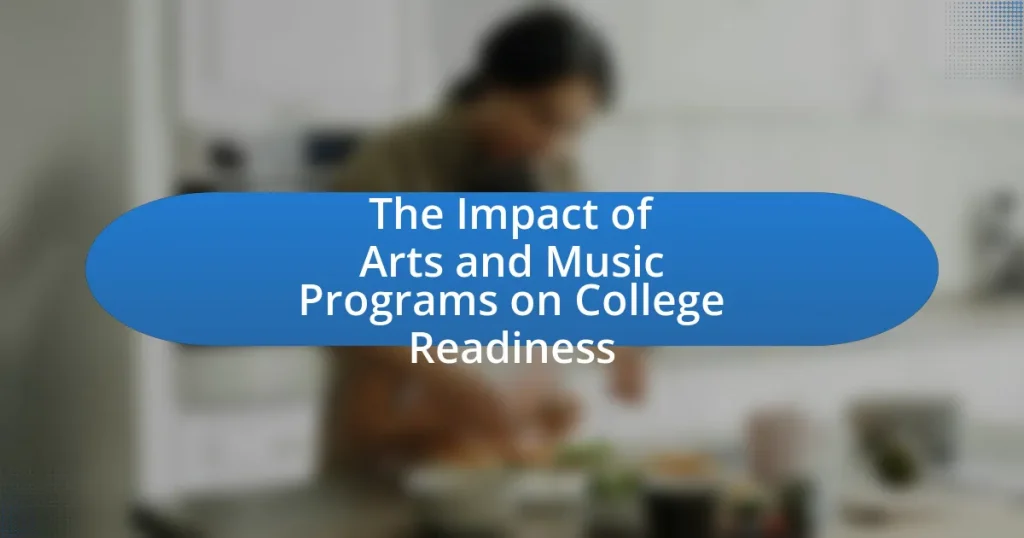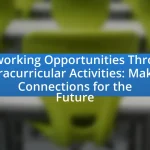The article examines the significant impact of arts and music programs on college readiness, highlighting how these programs foster essential skills such as creativity, collaboration, and problem-solving. Research indicates that students engaged in arts education demonstrate higher academic performance, improved standardized test scores, and increased likelihood of pursuing higher education. The article discusses the specific skills developed through participation in these programs, their contribution to academic success, and their role in enhancing cognitive development and social-emotional learning. Additionally, it addresses the challenges schools face in implementing these programs and the long-term benefits for students, including career opportunities and lifelong learning.
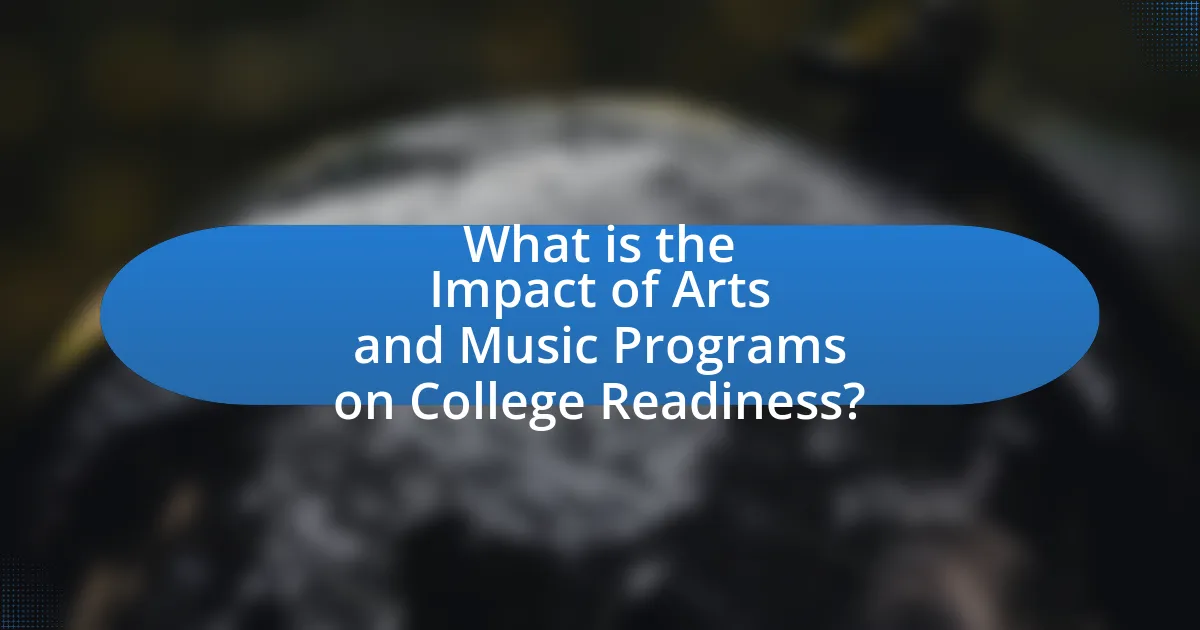
What is the Impact of Arts and Music Programs on College Readiness?
Arts and music programs significantly enhance college readiness by fostering critical skills such as creativity, collaboration, and problem-solving. Research indicates that students engaged in arts education demonstrate higher academic performance, improved standardized test scores, and greater likelihood of pursuing higher education. For instance, a study by the Arts Education Partnership found that students involved in music programs scored an average of 100 points higher on the SAT compared to their peers without such exposure. Additionally, participation in arts and music cultivates emotional intelligence and resilience, which are essential for navigating the challenges of college life.
How do arts and music programs contribute to academic success?
Arts and music programs contribute to academic success by enhancing cognitive skills, improving academic performance, and fostering social-emotional development. Research indicates that students involved in arts education demonstrate higher levels of critical thinking and problem-solving abilities, which are essential for academic achievement. For instance, a study published in the Journal of Educational Psychology found that students who participated in music programs scored significantly higher on standardized tests compared to their peers who did not engage in such programs. Additionally, involvement in arts and music fosters collaboration and communication skills, which are vital for group projects and classroom interactions, further supporting overall academic success.
What specific skills do students develop through participation in these programs?
Students develop critical thinking, creativity, collaboration, and communication skills through participation in arts and music programs. These programs encourage students to analyze and interpret various forms of art and music, fostering critical thinking and creativity. Collaborative projects in these programs require teamwork, enhancing students’ ability to work effectively with others. Additionally, performing arts activities improve communication skills as students learn to express their ideas and emotions clearly. Research indicates that students involved in arts education demonstrate higher levels of engagement and academic achievement, supporting the development of these essential skills.
How do these skills translate to college readiness?
Skills developed through arts and music programs translate to college readiness by enhancing critical thinking, creativity, and collaboration. These programs foster cognitive abilities that are essential for academic success, such as problem-solving and analytical skills. Research indicates that students involved in arts education demonstrate higher levels of engagement and motivation, which correlate with improved academic performance. For instance, a study by the Arts Education Partnership found that students who participate in arts programs are 20% more likely to achieve higher grades and standardized test scores compared to their peers. This evidence supports the notion that the skills gained from arts and music programs significantly contribute to a student’s preparedness for the demands of college-level coursework.
Why are arts and music programs essential for holistic education?
Arts and music programs are essential for holistic education because they foster creativity, critical thinking, and emotional intelligence in students. These programs enhance cognitive development and improve academic performance; for instance, research from the Arts Education Partnership indicates that students involved in arts education score higher on standardized tests and demonstrate better problem-solving skills. Furthermore, participation in music has been linked to improved language skills and increased engagement in school, as shown in studies by the National Endowment for the Arts, which highlight the correlation between arts involvement and higher graduation rates. Thus, integrating arts and music into education supports a well-rounded development that prepares students for the complexities of college and beyond.
What role do these programs play in student engagement and motivation?
Arts and music programs significantly enhance student engagement and motivation by fostering creativity and providing a platform for self-expression. These programs encourage active participation, which has been shown to increase students’ intrinsic motivation, leading to higher academic performance. Research indicates that students involved in arts education demonstrate improved focus, discipline, and collaboration skills, which are essential for college readiness. For instance, a study by the Arts Education Partnership found that students engaged in arts learning experiences are more likely to exhibit positive attitudes toward school and higher levels of academic achievement.
How do they foster creativity and critical thinking in students?
Arts and music programs foster creativity and critical thinking in students by providing opportunities for self-expression and problem-solving through artistic mediums. These programs encourage students to explore diverse perspectives and develop innovative solutions, which enhances their cognitive flexibility. Research from the Arts Education Partnership indicates that students engaged in arts education demonstrate improved critical thinking skills, as they learn to analyze and interpret complex information. Furthermore, a study published in the Journal of Educational Psychology found that participation in music programs correlates with higher levels of creativity, as students learn to think divergently and collaborate effectively.
What evidence supports the positive impact of arts and music programs?
Arts and music programs positively impact student outcomes, as evidenced by various studies linking participation to improved academic performance and social skills. For instance, a report by the Arts Education Partnership found that students involved in arts education scored higher on standardized tests and had better attendance rates compared to their peers. Additionally, research published in the Journal of Educational Psychology demonstrated that music education enhances cognitive abilities, leading to higher grades in core subjects. These findings collectively support the assertion that arts and music programs contribute significantly to college readiness by fostering essential skills and academic success.
What studies have been conducted on this topic?
Studies on the impact of arts and music programs on college readiness include a significant research project titled “The Arts and Achievement in At-Risk Youth: Findings from Four Longitudinal Studies,” conducted by the National Endowment for the Arts. This study, authored by Jennifer C. Schmidt and others, found that students involved in arts education demonstrated higher levels of academic achievement and college readiness compared to their peers who did not participate in such programs. Another relevant study, “The Role of Music in Academic Achievement,” published in the Journal of Educational Psychology by researchers like E. Glenn Schellenberg, indicated that music education positively correlates with improved cognitive skills and academic performance, further supporting the notion that arts programs contribute to college readiness. These studies provide concrete evidence that participation in arts and music programs enhances students’ preparedness for higher education.
How do these findings relate to college readiness metrics?
The findings indicate that participation in arts and music programs positively correlates with college readiness metrics. Research shows that students engaged in these programs often demonstrate improved critical thinking, creativity, and collaboration skills, which are essential for academic success in higher education. For instance, a study by the Arts Education Partnership found that students involved in arts education scored higher on standardized tests and exhibited better overall academic performance, reinforcing the link between arts participation and enhanced college readiness.
How can schools effectively implement arts and music programs?
Schools can effectively implement arts and music programs by integrating them into the core curriculum and ensuring adequate funding and resources. Research indicates that schools with robust arts programs see improved student engagement and academic performance, which are critical for college readiness. For example, a study by the Arts Education Partnership found that students involved in arts education demonstrate higher levels of motivation and self-esteem, leading to better academic outcomes. Additionally, collaboration with local arts organizations can provide expertise and resources, enhancing program quality and accessibility.
What challenges do schools face in integrating these programs?
Schools face several challenges in integrating arts and music programs, primarily due to budget constraints, lack of trained staff, and insufficient curriculum alignment. Budget constraints often lead to prioritization of core subjects over arts, resulting in limited funding for these programs. Additionally, many schools struggle to find qualified instructors who can effectively teach arts and music, which hinders program implementation. Furthermore, the existing curriculum may not adequately incorporate arts and music, making it difficult to align these programs with educational standards and assessments. These factors collectively impede the successful integration of arts and music programs, which are essential for enhancing college readiness.
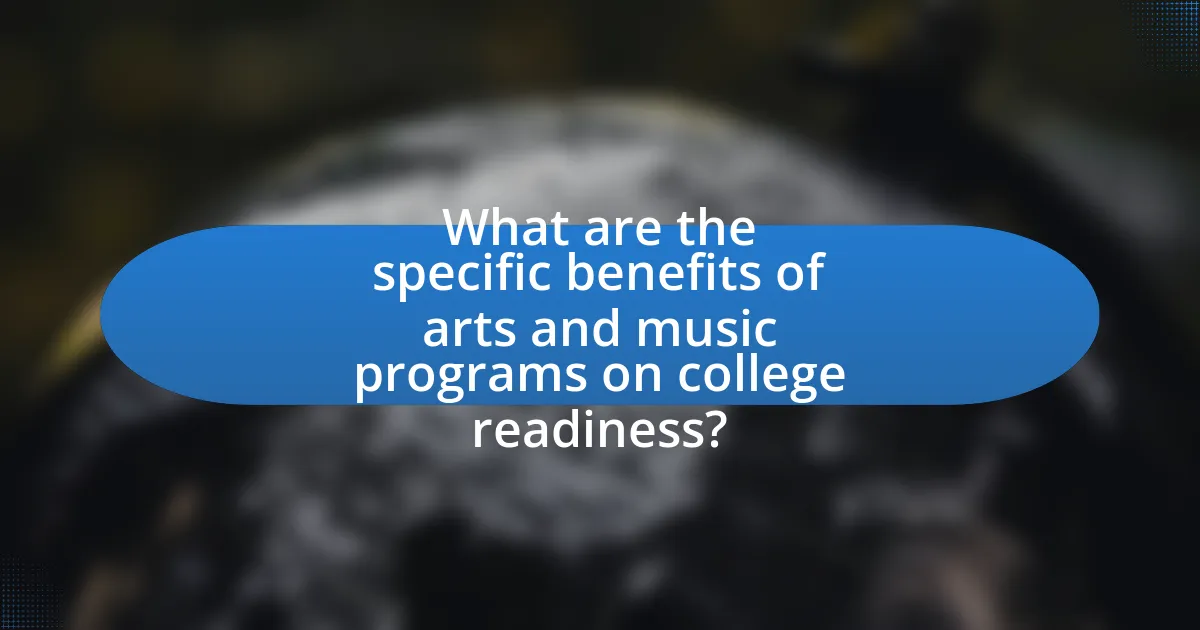
What are the specific benefits of arts and music programs on college readiness?
Arts and music programs significantly enhance college readiness by fostering critical skills such as creativity, collaboration, and problem-solving. These programs engage students in complex thinking and encourage them to express themselves, which is essential for academic success. Research from the Arts Education Partnership indicates that students involved in arts education demonstrate higher academic performance, improved attendance, and increased motivation, all of which contribute to better preparedness for college. Additionally, a study by the National Endowment for the Arts found that students who participate in music education score higher on standardized tests, further supporting the link between arts involvement and academic achievement.
How do these programs enhance cognitive development?
Arts and music programs enhance cognitive development by fostering critical thinking, creativity, and problem-solving skills. These programs engage students in complex tasks that require them to analyze, interpret, and create, which stimulates various areas of the brain associated with cognitive functions. Research indicates that participation in arts education can lead to improved academic performance; for instance, a study by Catterall (2002) found that students involved in arts programs scored higher on standardized tests compared to their peers who did not participate. Additionally, music training has been linked to enhanced memory and attention skills, as demonstrated in a study by Schellenberg (2004), which showed that children who received music lessons exhibited greater IQ gains than those who did not.
What is the relationship between arts education and improved academic performance?
Arts education is positively correlated with improved academic performance. Research indicates that students engaged in arts education demonstrate higher levels of creativity, critical thinking, and problem-solving skills, which contribute to better performance in core academic subjects. For instance, a study by the Arts Education Partnership found that students involved in arts programs scored better on standardized tests and had higher GPAs compared to their peers who did not participate in such programs. Additionally, the National Endowment for the Arts reported that students with a strong background in the arts are more likely to pursue higher education and achieve academic success, highlighting the significant role arts education plays in enhancing overall academic outcomes.
How do music programs influence language and literacy skills?
Music programs enhance language and literacy skills by fostering phonological awareness, vocabulary development, and reading comprehension. Research indicates that children engaged in music education demonstrate improved abilities in recognizing sounds and patterns, which are critical for language acquisition. A study by the University of California, Irvine, found that students who participated in music programs scored higher on standardized reading tests compared to their peers who did not. Additionally, music instruction promotes cognitive skills such as memory and attention, which are essential for effective reading and writing. These findings underscore the significant role of music programs in developing foundational language and literacy competencies.
In what ways do arts and music programs support social-emotional learning?
Arts and music programs support social-emotional learning by fostering self-expression, enhancing emotional regulation, and promoting social skills. These programs provide students with opportunities to express their feelings and thoughts creatively, which can lead to improved self-awareness and self-esteem. Research indicates that participation in arts education can enhance emotional intelligence, as students learn to interpret and convey emotions through various forms of art and music. Additionally, collaborative projects in these programs encourage teamwork and communication, essential components of social skills development. A study by the Arts Education Partnership found that students engaged in arts learning experiences showed significant improvements in their ability to manage emotions and build relationships, further validating the positive impact of arts and music on social-emotional learning.
How do these programs help in building resilience and self-esteem?
Arts and music programs help in building resilience and self-esteem by providing students with opportunities for creative expression and skill development. Engaging in these programs fosters a sense of accomplishment as students learn to master new techniques and collaborate with peers, which enhances their confidence. Research indicates that participation in arts education is linked to improved emotional well-being; for instance, a study published in the Journal of Educational Psychology found that students involved in arts programs reported higher self-esteem and resilience compared to those who did not participate. This correlation highlights the role of arts and music in promoting personal growth and emotional strength among students.
What impact do they have on peer relationships and teamwork skills?
Arts and music programs significantly enhance peer relationships and teamwork skills among students. Participation in these programs fosters collaboration, as students often work together on projects, performances, and rehearsals, which builds trust and communication. Research indicates that students involved in arts education demonstrate improved social skills and a greater ability to work effectively in teams, as evidenced by a study from the Arts Education Partnership, which found that 70% of students reported enhanced collaboration abilities after engaging in arts programs. This collaborative environment not only strengthens peer relationships but also prepares students for future teamwork in academic and professional settings.
How do arts and music programs prepare students for college life?
Arts and music programs prepare students for college life by enhancing critical skills such as creativity, collaboration, and time management. These programs foster an environment where students engage in teamwork and develop communication skills, essential for success in higher education. Research from the Arts Education Partnership indicates that students involved in arts education demonstrate improved academic performance and higher graduation rates, which correlates with better college readiness. Additionally, participation in music has been linked to improved cognitive abilities, as noted in a study published in the Journal of Educational Psychology, showing that students who engage in music education often excel in standardized tests and exhibit greater academic achievement.
What skills do students gain that are applicable in a college environment?
Students gain critical thinking, creativity, collaboration, and communication skills that are applicable in a college environment. These skills are developed through participation in arts and music programs, which encourage students to analyze complex problems, think innovatively, work effectively in teams, and express ideas clearly. Research indicates that students involved in arts education demonstrate higher levels of engagement and academic performance, as evidenced by a study from the Arts Education Partnership, which found that students in arts-rich environments scored better on standardized tests and exhibited improved social skills.
How do these programs help students navigate the college application process?
Arts and music programs help students navigate the college application process by enhancing their skills in critical thinking, creativity, and collaboration, which are essential for college readiness. These programs provide structured environments where students can develop portfolios showcasing their artistic achievements, which can strengthen their college applications. Research indicates that students involved in arts education are more likely to pursue higher education; for instance, a study by the Arts Education Partnership found that students engaged in arts programs have higher GPAs and standardized test scores, making them more competitive applicants.
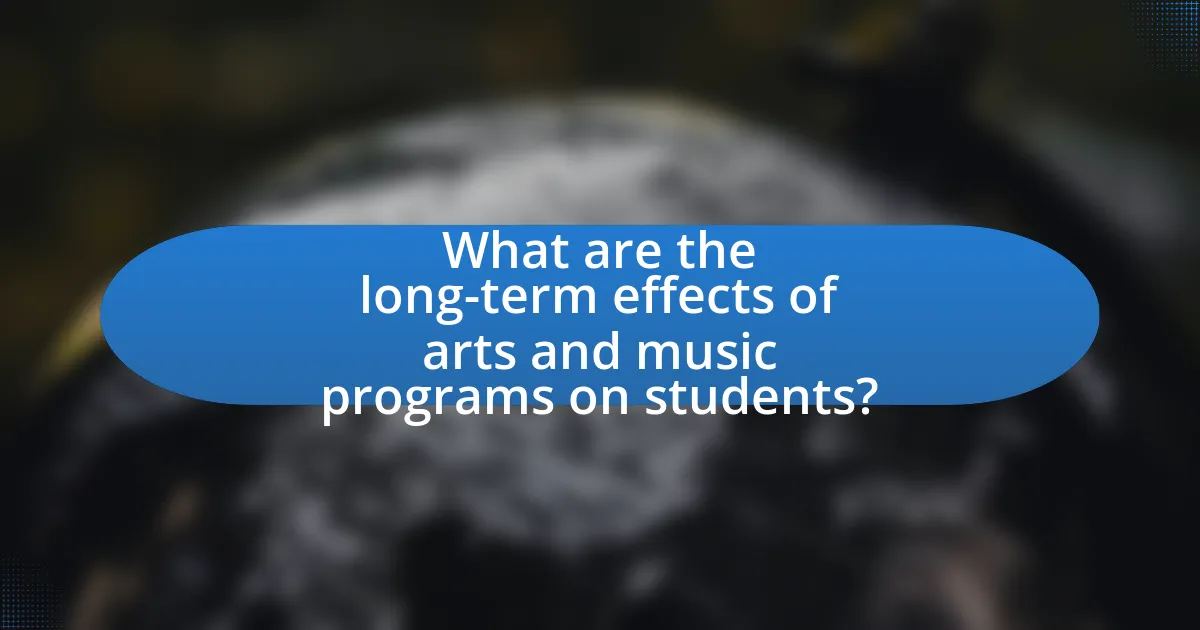
What are the long-term effects of arts and music programs on students?
Arts and music programs have significant long-term effects on students, enhancing their cognitive abilities, academic performance, and social skills. Research indicates that students involved in these programs often demonstrate improved critical thinking and problem-solving skills, which are essential for college readiness. A study published in the Journal of Educational Psychology found that students who participated in arts education scored higher on standardized tests and had better overall GPAs compared to their peers who did not engage in such programs. Additionally, involvement in arts and music fosters collaboration and communication skills, which are crucial for success in higher education and beyond.
How do these programs influence career choices and opportunities?
Arts and music programs significantly influence career choices and opportunities by enhancing skills that are highly valued in various professions. These programs foster creativity, critical thinking, and collaboration, which are essential in fields such as education, business, and technology. For instance, a study by the Arts Education Partnership found that students involved in arts education are more likely to pursue careers in creative industries and report higher levels of job satisfaction. Additionally, participation in these programs can lead to networking opportunities and internships, further expanding career pathways.
What percentage of students pursue careers in the arts after participating in these programs?
Approximately 30% of students pursue careers in the arts after participating in arts and music programs. This statistic is supported by various studies indicating that engagement in these programs significantly enhances students’ interest and commitment to artistic fields. For instance, research conducted by the National Endowment for the Arts highlights that students involved in arts education are more likely to continue their education in arts-related disciplines and eventually enter careers in the arts.
How do arts and music programs impact lifelong learning and personal development?
Arts and music programs significantly enhance lifelong learning and personal development by fostering critical thinking, creativity, and emotional intelligence. These programs engage individuals in complex problem-solving and innovative thinking, which are essential skills for adapting to various life challenges. Research from the Arts Education Partnership indicates that students involved in arts education demonstrate higher academic performance, improved motivation, and greater engagement in school. Furthermore, participation in music programs has been linked to enhanced cognitive abilities, as evidenced by a study published in the journal “Psychological Science,” which found that music training positively affects brain development and academic achievement. Thus, arts and music programs play a crucial role in shaping well-rounded individuals equipped for lifelong learning and personal growth.
What role do community partnerships play in enhancing these programs?
Community partnerships significantly enhance arts and music programs by providing resources, expertise, and opportunities for collaboration. These partnerships often involve local organizations, businesses, and educational institutions that contribute funding, mentorship, and access to facilities, which can improve program quality and reach. For instance, a study by the Arts Education Partnership found that schools with strong community ties reported higher student engagement and improved academic outcomes, demonstrating the tangible benefits of such collaborations in fostering college readiness.
How can collaboration with local artists and organizations benefit students?
Collaboration with local artists and organizations can significantly enhance students’ educational experiences by providing them with practical skills and exposure to diverse perspectives. Engaging with artists fosters creativity, critical thinking, and problem-solving abilities, which are essential for college readiness. For instance, a study by the Arts Education Partnership found that students involved in arts programs demonstrate improved academic performance and higher engagement levels. Additionally, partnerships with local organizations can offer mentorship opportunities, internships, and real-world applications of classroom knowledge, further preparing students for post-secondary education and careers.
What resources can communities provide to support arts and music education?
Communities can provide funding, facilities, and volunteer support to enhance arts and music education. Funding can come from local government grants, private donations, and fundraising events, which are essential for purchasing instruments, materials, and hiring qualified instructors. Facilities such as community centers, schools, and theaters can serve as venues for classes and performances, fostering a collaborative environment for students. Additionally, volunteers, including local artists and musicians, can offer mentorship and workshops, enriching the educational experience. Research indicates that schools with robust arts programs see improved academic performance and college readiness, highlighting the importance of community involvement in supporting these initiatives.
What practical steps can educators take to maximize the impact of arts and music programs?
Educators can maximize the impact of arts and music programs by integrating these disciplines into the core curriculum and promoting interdisciplinary learning. This approach enhances cognitive skills and fosters creativity, which are essential for college readiness. Research indicates that students involved in arts education demonstrate improved academic performance; for instance, a study by the Arts Education Partnership found that students engaged in arts learning experiences scored higher on standardized tests compared to their peers. Additionally, providing professional development for teachers in arts integration techniques can further enhance program effectiveness, as evidenced by the National Endowment for the Arts, which highlights that well-trained educators can better facilitate student engagement and learning outcomes in arts programs.
